China's intrigue and the opening of its Embassy in Kiribati at the height of the pandemic

China opened its Embassy in Kiribati in May, at the height of the COVID-19 health crisis, in southern Tarawa, the main island of this nation of 33 atolls and reef islands in the central Pacific with a population of 116,000. Only three other countries (Australia, New Zealand and Cuba) have established a diplomatic delegation there. The Chinese initiative is not accidental, but is part of Beijing's intention to increase its influence in the Pacific and this may have an effect on global geopolitics and the world after the end of the coronavirus pandemic.
The establishment of the Chinese Embassy in Kiribati came after a series of approaches from the small country towards the Asian giant, such as the re-establishment of diplomatic relations or the re-election of Taneti Maamau, a president very close to the Chinese orbit, in recent elections. It was an electoral battle which confronted him with Banuera Berina, an opponent who has shown sympathy for Taiwan (also known as the Republic of China), the traditional rival of the great People's Republic, which claims that nation as its own and which many years ago gained ground at international level from its small neighbour, poorly acknowledged internationally as opposed to a communist China widely supported internationally and with great weight in all kinds of bodies.
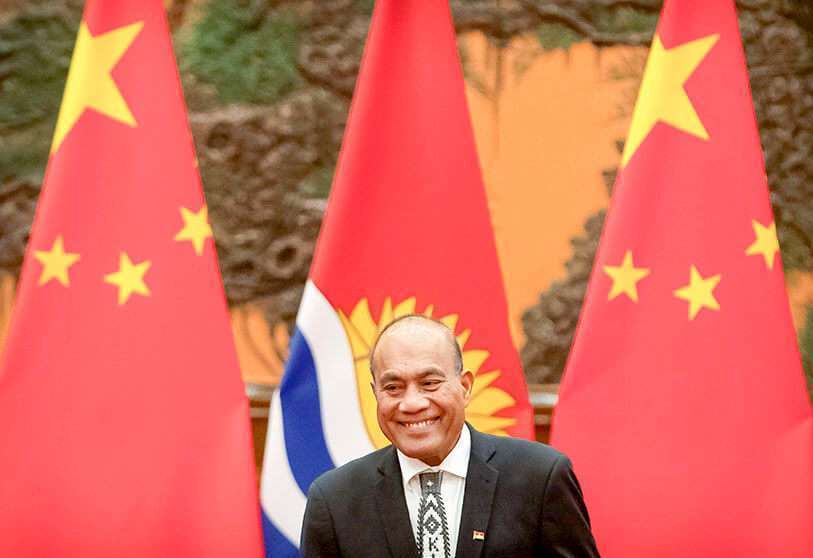
With the rise of Maamau to power, Taiwan loses Kiribati as one of the countries recognizing it as a sovereign nation worldwide. A list that is now reduced to 15 States (Belize, Guatemala, Haiti, Honduras, Nicaragua, Paraguay, St. Kitts and Nevis, St. Lucia, St. Vincent and the Grenadines, Swaziland, the Vatican, the Marshall Islands, Nauru, Palau and Tuvalu).
When Maamau announced last September his decision to decant his country's support for Beijing, even his own party members were surprised. In fact, Kiribati's ambassador to the United Nations and the United States, Teburoro Tito (himself a former Kiribati president), was in the office of the U.N. secretary-general arguing the case of Taiwan regarding attendance at meetings organized by the international body when he learned of the decision. In addition, Maamau was elected in 2016 committed to maintaining the ties with Taiwan initiated by his predecessor, Anote Tong, in 2003. This shows the great shift in his policy today towards a People's Republic of China that has gained another partner in the Pacific.
The sudden shift to Beijing in 2019 was initially not well received in Kiribati. Pro-Taiwan demonstrations were held, with slogans such as We love Taiwan, we hate China, we want peace'; the opposition finally accused the government of failing to consult the people on this thorny issue.
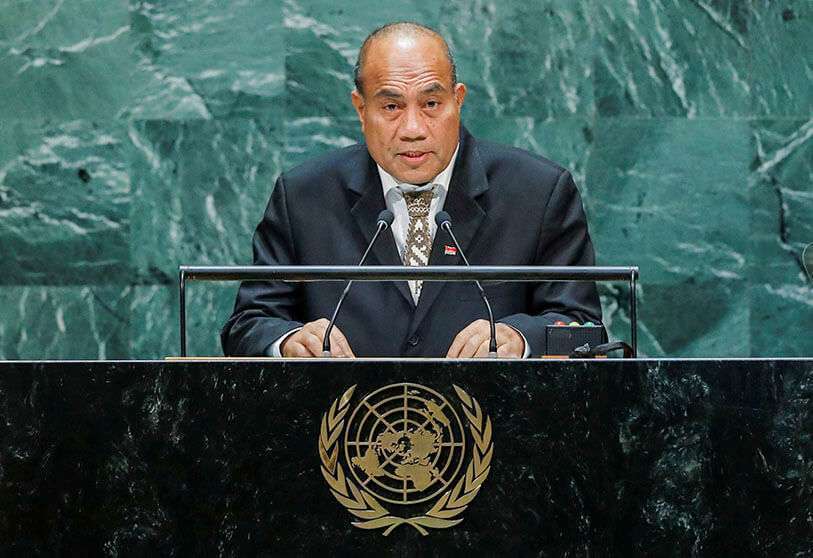
The move also caused enough members of parliament from Maamau's party, including Banuera Berina himself, to launch into opposition and deprive the current president of his comfortable parliamentary majority when a new House was elected in April.
According to Kiribati sources, there were several reasons for the change in Taiwan's presidential orientation towards the Chinese communist regime. Among them, that the Maamau Administration has embarked on an ambitious program to develop the country and lift its people out of poverty, taking advantage of tourism, mainly on Christmas Island, and tuna fishing, as several analysts explained to Foreign Policy.
For this task, the Executive decided that it needed two long-range Embraer planes with 92 seats to link Tarawa, the capital island, with Christmas Island, some 3,200 kilometres to the east, and with the world beyond. He reportedly paid $60 million for one plane and asked Taiwan for a grant to buy the second one, something to be considered since the small Asian nation's annual aid to Kiribati was about $10 million. Taiwan rejected this initiative, according to the opposition of President Tsai Ing-wen. Taiwanese Foreign Minister Joseph Wu, when announcing the diplomatic rupture, wanted to argue the case, explaining that Maamau had requested massive financial assistance from Taiwan to buy commercial aircraft while Taiwan had offered to provide a preferential commercial loan instead; a proposal not accepted by Kiribati.
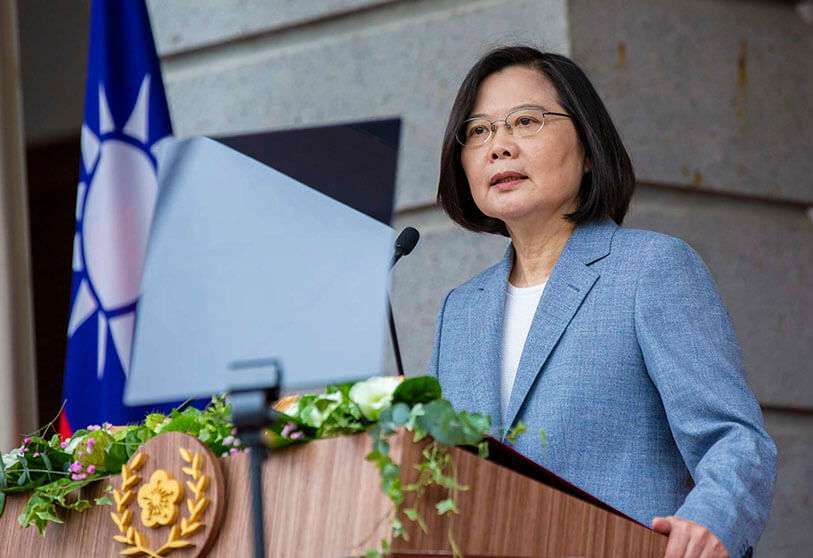
However, Berina, the former leader of Maamau's party, defector and opponent in the last elections, explained in an interview that Taiwan had given a very different version in the dialogue with the responsible negotiators in Kiribati. Allegedly, they offered the small state a hidden subsidy disguised as a loan, after which payment due Taiwan would increase bilateral aid in proportion, so that the Asian nation would cover the repayment of the loan.
These rifts have been wisely exploited by China, which has made a key step in expanding to the Americas through the Pacific. Local media argued that current leader Taneti Maamau easily defeated opposition leader Banuera Berina, a former Maamau ally who became his rival on the issue of relations with Beijing, after China was heavily involved in the election campaign, even with the announcement of aid promises to this Pacific state. It should be noted that there were also rapprochements in the past, such as the one in 2006 by former Chinese Prime Minister Wen Jiabao, who visited Kiribati and promised to donate 3 billion yuan ($425 million) in loans for agricultural and other relevant industry development.
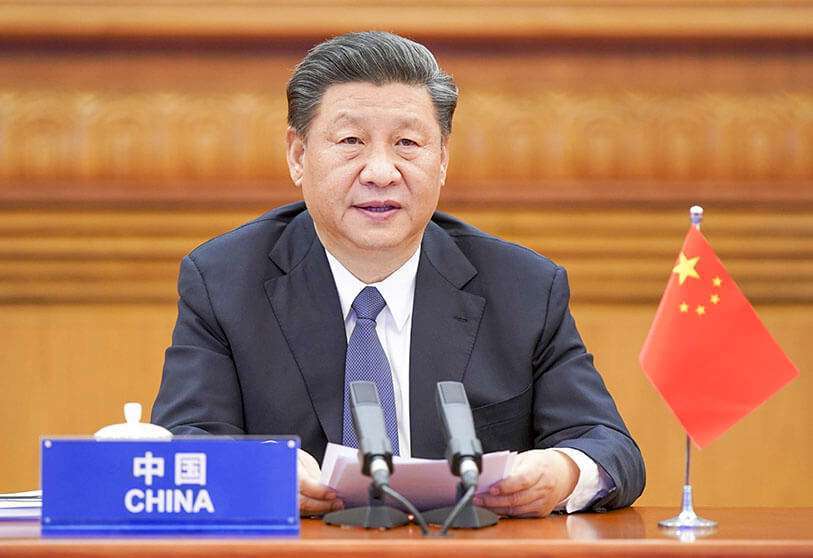
China's strong commitment to the Pacific islands has come recently; at a turbulent time due to the COVID-19 pandemic, which has resulted in only a few hundred cases and almost a dozen deaths across the islands (far from the large numbers handled elsewhere). Beijing has been the reference for these countries, thanks to the activity of experts giving lectures and donations of more than two million dollars in cash, including medical supplies to combat the pathogen. In return, the Pacific islands enthusiastically supported the Chinese state's response to the coronavirus, praising "its open, transparent and accountable approach in taking timely and robust response measures and sharing its experience in containment," at a time when the communist regime had been criticized by rivals such as the United States for its initial handling of the coronavirus problem.
Kiribati is the most recent instance of Beijing’s growing influence in the Pacific, which consists of a string of resource-rich islands that management very important waterways between Asia and America. An area of obvious interest that is currently confronting, above all, Chinese and Americans, who are engaged in other battles as well, such as the famous trade war they started in recent months.
The picturesque islands have lengthy been aligned with the US, which has a massive army presence, and allies equivalent to Australia, the area’s largest donor and security partner. But lately, many have solid nearer ties with China because of Beijing’s diplomatic and financial outreach — creating a fault line for geopolitical tensions.
For the Pacific Islands, which have a combined Gross Domestic Product (GDP) of approximately $33.77 billion (less than 1% of China's total GDP), Beijing has become an essential support during the pandemic. Chinese health experts have given recommendations on how to fight the coronavirus through video conferencing with their counterparts in the ten Pacific Island countries that share diplomatic relations with the communist regime. Also in March, the Asian giant announced the donation of $1.9 million in cash and medical supplies to countries in the area to help them combat the pathogen, according to Chinese diplomatic delegations from the Pacific region.
Along with Kiribati, China also has a fluid relationship with other countries in the area such as Samoa. During this time, Chinese medical teams have been working on Samoan territory to help local health authorities implement measures to contain the spread of the coronavirus. In a nation like Fiji, support and even specialized military vehicles were provided.
The islands have to this point largely warded off the coronavirus due to their remoteness and early lockdown measures. But native communities might face devastating penalties if the virus was to be hit, due to insufficient well-being care and lack of testing capability, consultants have warned. “China’s engagement in the Pacific today has been one driven by opportunism, they’re trying to gain as much influence as they can,” stated Jonathan Pryke, director of the Pacific island program on the Lowy Institute.
In May, when China was dealing with an international backlash over its early dealing with of the coronavirus outbreak, it turned to the Pacific for assist. Days earlier than the World Health Assembly assembly in May, ministers from 10 Pacific Island nations joined a video convention on Covid-19 convened by China. The assembly ended with a glowing affirmation of China’s coronavirus response.
A political and humanitarian movement in times of crisis that has earned the Asian giant an exponential improvement in its position in the Pacific. This contrasts with the harsh criticism of the US government of Donald Trump, who repeatedly blamed China for the origin and spread of the pandemic; and with the Australian position, which was even aligned with the request for an independent investigation into the doubts surrounding the emergence of the disease, which official versions place in a market of fresh animal products in Wuhan, in the province of Hubei, and which other theories relate to the activity of a laboratory in that same Chinese city.
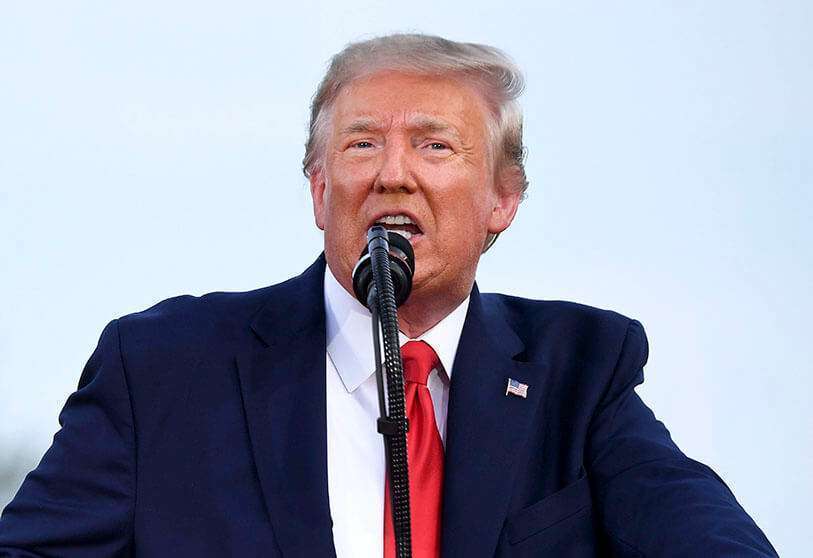
Beijing is increasingly influential in the Pacific, a key area because of the presence of many rich islands that control key river areas between Asia and the Americas. However, the country that has made the greatest commitment to this area is undoubtedly Australia, which has given financial support to 10 countries in the region to the tune of $69 million.
The role of this country is fundamental, since at the moment there are discussions about promoting travel between Australia and New Zealand when COVID-19 contagion cases are stabilized; and some countries such as Fiji, Samoa and the Solomon Islands, all in the Pacific, have shown their willingness to enter into this dynamic. China has not yet talked about this, but it seems a possibility, and more so after its strong position in the area.
Moreover, it should be noted that, thanks to the recent move, China could be very close to Hawaii, especially considering that Kiribati, very close to the state integrated into the United States, now has the aforementioned elected president linked to the sphere of the communist giant.
Maamau's re-election gives China the tempting possibility of establishing itself on the Christmas Island of Kiribati, the world's largest atoll with an area of 150 square kilometres. It is located only about 2,100 kilometers south of Honolulu, home of the U.S. Army Pacific Command. The possible construction of port facilities on Christmas Island, apparently for tourism but with the capacity to be used by Chinese warships, is a concern for the U.S. military.
In recent years, Beijing's growing influence in several Pacific nations, such as Kiribati and the Solomon Islands, has caused controversy and, according to experts, threatens stability in the region, which has traditionally been controlled by the United States and Australia. U.S. Secretary of State Mike Pompeo has already expressed concern about China's "authoritarian" influence in the Pacific during a visit to the region in August last year.

Kiribati has received approximately $4.2 million from the Chinese government for various projects in recent months and is home to a Chinese space station that some observers say it could be used for strategic and operational purposes. In addition to the above-mentioned fact of Christmas Island and its proximity to Honolulu.
Maamau's political settlement confirms the latest trend, which sees Pacific nations, traditionally aligned with the US and Australia, intensifying commercial, and somewhat more than commercial, ties with Beijing. Indeed, Kiribati is a country historically grateful to Washington, given the liberation from Japanese control during World War II. This event led the Tawara Executive, immediately after achieving independence from the United Kingdom in 1979, to sign a pact that stipulates that there can be no foreign military installations on Kiribati's territory without US consent.
The Chinese movements in recent weeks have even provoked military manoeuvres. For example, three US Navy aircraft carriers were recently deployed in the Pacific Ocean for the first time in years, which has drawn swift reaction from China, with state-sponsored media saying Beijing will not back down to defend its interests in the region.
The USS Ronald Reagan and the USS Theodore Roosevelt are both patrolling in the western Pacific, while the USS Nimitz is in the east, according to US Navy press releases. With each vessel containing more than 60 aircraft, it represents the biggest deployment of US aircraft carriers in the Pacific since 2017 -- when tensions with North Korea over Pyongyang's nuclear weapons program were at their peak.

"Carriers and carrier strike groups writ large are phenomenal symbols of American naval power. I really am pretty fired up that we've got three of them at the moment," Rear Adm. Stephen Koehler, director of operations at Indo-Pacific Command in Hawaii, told AP.
In response, the Communist Party's Global Times mouthpiece said the carriers could threaten troops in the disputed South China Sea. "By massing these aircraft carriers, the US is attempting to demonstrate to the whole region and even the world that it remains the most powerful naval force, as they could enter the South China Sea and threaten Chinese troops on the Xisha and Nansha islands (Paracel and Spratly islands) as well as vessels passing through nearby waters, so the US could carry out its hegemonic politics," the Global Times report quoted Li Jie, a Beijing-based naval expert, as saying.
In the face of this, China is also exhibiting military muscle in the midst of the coronavirus pandemic. The People's Liberation Army's official English website also highlighted the armaments available to China's military, adding that Beijing could hold drills in response to show off its firepower. "China possesses aircraft carrier killer weapons like the DF-21D and DF-26 anti-ship ballistic missiles," the official military media said.
All of this comes at a time when the Chinese government has significantly increased its influence in the overall Southeast Asian region through the creation of the world's largest free trade zone, an economic entity that spans all of the countries of the Association of Southeast Asian Nations (ASEAN). Despite the fact that the economic and military spheres are different, the geopolitical manoeuvres being carried out by the Chinese regime headed by Xi Jinping should not be underestimated.










